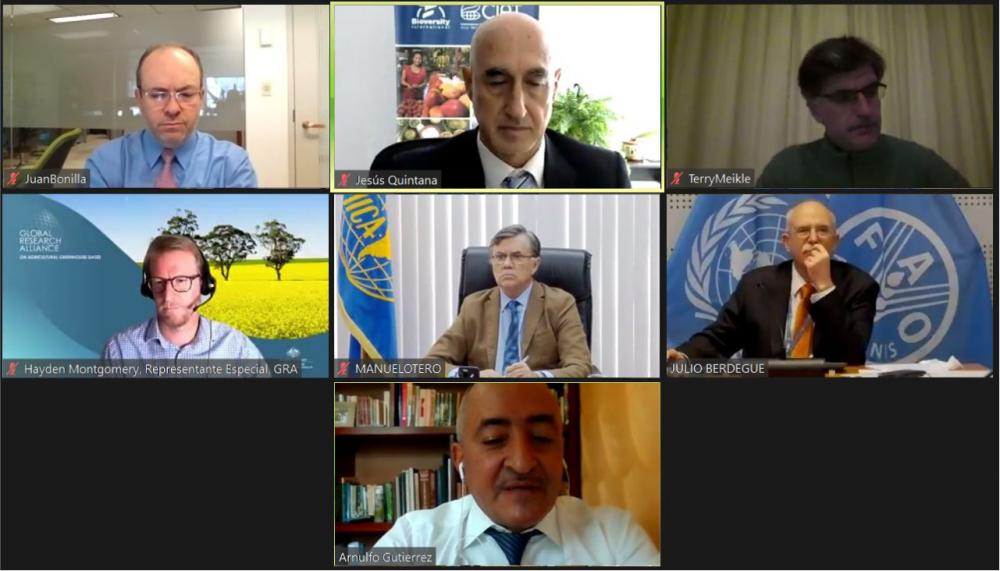The panel discussion “Challenges Facing Science, Agriculture and Food by 2030: How to foster investment in scientific research and innovation in Latin America and the Caribbean” was held virtually during the XXV Annual Meeting of FONTAGRO’s Board of Directors.

Washington, 2 November 2021 (IICA) – Governments, the private sector, civil society organizations and international organizations must engage in coordinated work to foster investments in science and technology that can contribute to transforming agrifood systems and making them more sustainable. That was the consensus of specialists with extensive experience in cooperation with the agriculture sector and rural development in Latin America and the Caribbean.
The panel discussion “Challenges Facing Science, Agriculture and Food by 2030: How to foster investments in scientific research and innovation in Latin America and the Caribbean” was held virtually during the XXV Annual Meeting of FONTAGRO’s Board of Directors. With more than 20 years of experience, FONTAGRO is a funding mechanism that promotes science, technology and innovation in the field of agriculture and food in Latin America, the Caribbean and Spain. The Inter-American Institute for Cooperation on Agriculture (IICA) is one of its sponsors.
The panelists were Juan Pablo Bonilla, Manager of the Climate Change and Sustainable Development Sector of the Inter-American Development Bank (IDB); Jesús Quintana García, Executive Director for the Americas of the Bioversity-CIAT Alliance; Terry Meikle, Agricultural Advisor for Latin America at the Ministry of Primary Industries of New Zealand; Hayden Montgomery, Special Representative of the Global Research Alliance on Agricultural Greenhouse Gases (GRA); Julio Berdegué, FAO Representative for Latin America and the Caribbean; and Manuel Otero, Director General of IICA.
The debate was moderated by Arnulfo Gutiérrez, Vice President of FONTAGRO, who noted that the institution plays a key role in the region, creating networks of scientists and technical specialists who promote innovation.
The president of FONTAGRO, Pedro Bustos Valdivia, highlighted the importance of research institutes for the agriculture sector of the different countries. He noted that FONTAGRO works alongside these institutions as an ally of scientific development for food production throughout the continent.
“The question is how to achieve a much more competitive sector while taking into account environmental and social issues”, remarked Bonilla, who highlighted the heterogeneity that characterizes the rural areas of Latin America and the Caribbean, where family farmers engaged in subsistence agriculture coexist with large agribusinesses.
“The post-Covid-19 recovery process must address matters related to productivity, climate change and sustainability, as part of a whole”, added the IDB official, who spoke of the need to provide “unconditional cash transfers to poor rural areas in the region, to rapidly provide resources. Subsequently, with technical assistance, these transfers could become conditional on results”.
Quintana-García considered that investment in science, research and technology will be decisive for addressing interconnected, growing global challenges, which include food systems in crisis and the loss of biodiversity. “In Latin America, 10% of people still suffer from hunger and 24% from obesity”, he warned.
In this regard, he stated that institutions dedicated to technical cooperation must generate new ways of working. “We must demonstrate that our work is useful, by communicating more and better. We must implement solid systems for measuring results. Nutrition, environmental degradation and climate change are inter-connected challenges that must be addressed through greater investment. We must advocate for the critical role of science and research in the transformation of food systems, placing special emphasis on innovation and creative, modern solutions”.
Meikle, who has a long history of cooperation with Latin America from different positions in the New Zealand government, warned that “when we talk about science, innovation and technology, we must not forget about indigenous communities. They must participate in discussions given their traditional knowledge, which offers solutions to climate change and the future of the world”.
Hayden Montgomery explained that the Global Research Alliance on Agricultural Greenhouse Gases (GRA) brings together 65 countries, many of them from Latin America and the Caribbean, and seeks ways to improve productivity while reducing the emission of gases that contribute to climate change.
“We work to promote investment and cooperation in scientific research and innovation in Latin America and the Caribbean, and we have achieved a great deal. We also facilitate extra-regional collaboration, and we have the European Union as a partner, because we are convinced that the answer is to invest and collaborate. And that requires people with energy and conviction”.
For his part, Manuel Otero welcomed the fact that there is greater global awareness of the need for agrifood systems to transition towards greater sustainability. “At present, there is consensus on the importance of science and technology to transition towards a greener, more inclusive and resilient agriculture sector. This is a historic opportunity”, he noted.
The Director General of IICA recalled that the countries of the Americas had reached consensus this year on the path towards transforming agrifood systems, as expressed in a document comprised of 16 messages that was presented in September at a summit organized by the United States. He highlighted message number 9, which states that the new science and technology scenarios provide an opportunity to transition towards precision agriculture, with the bioeconomy and the circular economy playing a key role in the process, and with special emphasis on reducing food waste.
“We cannot continue to rely solely on States. International cooperation agencies, civil society and the private sector must share this responsibility, because a single institution will not save the world. Together, we must ensure that innovation provides clear and effective solutions for the future of agrifood systems”, he concluded.
In turn, Julio Berdegué emphasized that “the transformation of food systems cannot take place in the absence of research, science and technology”. He also considered that the challenge at hand is not to achieve greater investments in this area, but rather to channel them through greater participation of cooperation organizations.
More information:
Institutional Communication Division
comunicacion.institucional@iica.int











